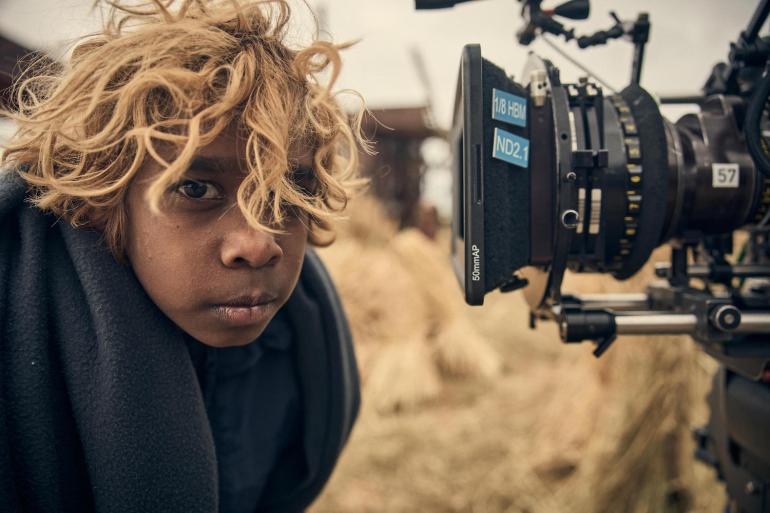Warwick Thornton’s screenplay for The New Boy, Colin and Cameron Cairnes’ screenplay for Late Night with the Devil, and Tony McNamara’s script for Poor Things have been nominated for the $30,000 Betty Roland Prize for Scriptwriting.
The award is part of the 2024 NSW Premier’s Literary Award for the screenplay of a feature film, documentary film, play or documentary for radio, or for the script of a television program.
The judges said Thornton’s take on the impact of colonial assimilation was original and subversive.
“This is a magical script whose visual imagery is laden in metaphorically poetic shafts and whose meaning often lies below the surface — not quite visible, but deeply felt. The dialogue is sparse, with the protagonist, New Boy, uttering only a handful of words. Even the other characters are not dialogue reliant. Instead, their actions or inactions reveal much about the wake of their choices and determinations within the world they have found themselves.”
They called the Cairnes’ brothers horror film, Late Night With The Devil, a “whip of a ride that grabs the reader from the first scene and pushes in ever increasing stakes of unease to finally reach the macabre.”
“The location and all that it stands for — media, ratings, pleasing an audience — is used to its full extent to create a well-crafted metaphor for the ruthlessness of TV, the price of ratings and toxic entertainment culture. Cameron and Colin Cairnes cleverly place all of this in a tight horror package that pushes the envelope of the format by playing with a mix of elements including live camera, behind the scenes components and found footage.”
Tony McNamara’s script for Poor Things, which garnered McNamara an Oscar nomination, was an “astounding, unexpected script”.
“Each stage progresses this unusual character through an embracing of sexual autonomy in a defiance that begins with innocent, curious naivete and lands in a place of worldly wisdom. Tony McNamara has created an engaging romp, executed beautifully, in a tone that is light-hearted even within the darkness, yet remains deeply questioning of societal standards, expectations and norms.”
Other nominees include Safe Home, Episode 1, by Anna Barnes (Kindling Pictures).
“This is a crisp and precisely written pilot episode script that starts with an office drama feel, but swiftly flicks into a murder mystery that focuses on people experiencing family violence. Built from Anna Barnes’ own experience working in family violence community legal centres, Safe Home, Episode 1 follows Phoebe, a young woman who leaves her communications job at a prestigious law firm to join an overwhelmed and underfunded family violence legal centre.”
The Giants by Laurence Billiet and Rachael Antony (General Strike & Matchbox Pictures), was also nominated. The judges called it “a crystal-clear vision of the pressures and courage of activist and politician Bob Brown”.
Shayda by Noora Niasari (Origma 45, Dirty Films & Parandeh Pictures) was the final nomination.
“This is a truly remarkable script inspired by Noora Niasari’s childhood story of experiencing domestic violence within a migrant context, and by her mother’s courage in breaking away,” the judges said. “The script is a lyrically paced, beautiful read whose characters are gently drawn within a structure that reveals layers of story through visual and understated, yet metaphorically powerful, means.”
Meanwhile, The Lost Flowers of Alice Hart, Episode 1, ‘Black Fire Orchid’, by Sarah Lambert, was highly commended by the judges.
“This is an expertly written pilot episode setting up layer upon layer of mystery embedded in the reader’s emotional need to know what will happen to Alice. Sarah Lambert opens with a sharp hook of Alice imagining burning her father alive then swiftly paints a contrasting picture of a perfect family. She builds this image then strips it back to reveal Clem’s cruel domination of Agnes and Alice. The reader is led through very dark territory by an assured and highly skilled hand who lays down the visual, metaphorical and literal language of flowers to guide us through this world.”


